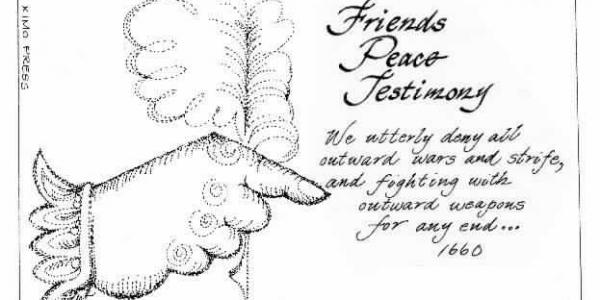Quaker Commitment to Peace & Non-Violence
Our Peace Testimony
![]() We utterly deny all outward wars and strife and fightings with outward weapons, for any end, or under any pretense whatsoever; and this is our testimony to the whole world.
We utterly deny all outward wars and strife and fightings with outward weapons, for any end, or under any pretense whatsoever; and this is our testimony to the whole world. ![]()
George Fox, Declaration of Friends to Charles II, 1660

The Basis of Our Peace Testimony
That of God in everyone

Quakers hold that there is “That of God in everyone”. It is this belief that forms the basis of what is called the Quaker Peace Testimony.
Testimonies are a way the Quakers, or Friends as we commonly call ourselves, express to the world our beliefs, our spiritual insights.
Originally the Religious Society of Friends, as Quakers are formally known, merely refused to bear arms. However, in 1660, Margaret Fell co-founder of the Religious Society of Friends, expounded on Fox’s Declaration with these words:
“We are a people that follow after those things that make for peace, love, and unity; it is our desire that others’ feet may walk in the same, and do deny and bear our testimony against all strife, and wars.”
Of course, the Peace Testimony continues to evolve.
How Quakers Respond to the Peace Testimony
Sidney Bailey, expert in Foreign Affairs, pacifist and a former head of the Quaker United Nations Office, identified the three principle ways that Quakers’ respond to the Peace Testimony:
- A refusal to bear arms or take part in military service
- An obligation to help victims of war and conflicts
- A commitment to active peace-making
For a complete history of the Quaker Peace Testimony, click here.
The Peace Testimony As We Live It
![]() The Peace Testimony – Deeds Not Creeds
The Peace Testimony – Deeds Not Creeds![]()
Canberra and Region Quakers live the Peace Testimony in large and small ways.
Globally and Locally
Canberra & Region Quakers serve on a variety of Quaker and community organisations devoted to peace and non-violence, for example:
- The Quaker Peace & Legislation Committee. QPLC represents Australian Quakers on national and international peace concerns.
- The Independent & Peace Australia Network. IPAN is a network of organisations around Australia aiming to build public dialogue and pressure for change to a truly independent Australian foreign policy.
- Women’s International League for Peace & Freedom. WILPF brings a feminist perspective to the analysis of root causes of war and conflict, and emphasizes the gendered impacts of conflict and war.
Quakers Work for Peace at the U.N.
The Religious Society of Friends is represented at the United Nations in both New York and Geneva. It also heads up a number of bodies with an international peace as well as a social and economic justice focus, for example:
- Friends World Committee for Consultation (FWCC). FWCC speaks on behalf of Quakers in international spaces in matters of peace, climate and social equality.
- The Quaker Institute for the Future (QIF). QIF eeks to generate insight, knowledge and wisdom that informs public policy and enables us to treat all humans and the whole commonwealth of life as a sacred community.
- The American Friends Service Committee (AFSC). AFSC promotes a world free of violence, inequality, and oppression.
- Quaker Peace and Social Witness UK. A UK-based organization that promotes and undertakes peace and social justice in line with the Peace Testimony.
- Friends Peace Teams. Develops long-term relationships with communities in conflict.
As Canberra & Region Quakers is located in the national capital, we are uniquely placed to represent issues of peace as well as social and economic justice to our Federal Parliamentarians through private meetings and discussions, which we regularly do.
![]() I practice the Peace Testimony in my work as a mediator and restorative justice convenor. – An ACT Quaker
I practice the Peace Testimony in my work as a mediator and restorative justice convenor. – An ACT Quaker![]()
Within Our Meeting
![]() The Peace Testimony is more than not killing. It’s also about my personal choices in terms of what I eat and what I wear… An ACT Quaker
The Peace Testimony is more than not killing. It’s also about my personal choices in terms of what I eat and what I wear… An ACT Quaker![]()
The Peace testimony inspires us to bring the principles of peace, non-violence and mutual respect into our daily lives and relationships, including within our Meeting.
Conflicts, misunderstandings and competing interests do occur in all our relationships, including within our Meeting. When these arise, we have a number of processes that help us to resolve conflict, rebuild mutual trust and restore relationships, for example:
- Meetings for Clearness. Small group meetings where a Friend seeks a way forward on an issue of importance in their life.
- Threshing Meetings. Group meetings where Friends work through controversial issues by listening and sharing and without pressure to come to a particular outcome.
- Meetings for Reconciliation. A formal process for resolution of conflicts and repair of harm based on Restorative Justice principles.
For a comprehensive overview of how we handle conflict within Quaker Meetings click here.
![]() I aim to be a peacemaker – not just out there in the world but also in my closest relationships. – An ACT Quaker
I aim to be a peacemaker – not just out there in the world but also in my closest relationships. – An ACT Quaker![]()
More about the Peace Testimony and Quaker Commitment to Peace & Non-violence:
QPLC Brief on the Peace Testimony – History & Potential Areas for Peacemaking
https://www.quakersaustralia.info/concerns/peace
https://www.quakersintheworld.org/quakers-in-action/111/Peace-and-Nonviolence
http://www.livingpeacemuseum.org.au/s/alpm/page/quaker-opposition-war

